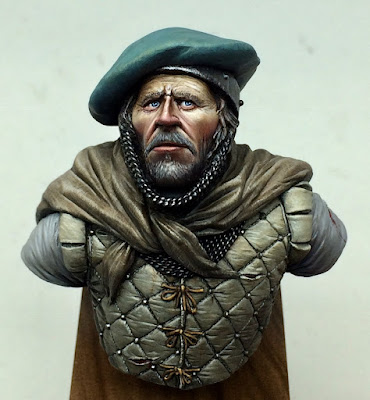 |
| A reiver awaiting justice, or something like it |
In late 1593 the eastern borders of England and Scotland erupted into open warfare. The cause was a personal dispute between the respective deputy wardens of the Marches: these were Robert Carey, cousin to Elizabeth I, on the English side, and Robert Kerr on the Scottish side, called 'firebrand' after his fierce temper.
Carey had only recently come to the turbulent Border. He had tried to befriend his opposite number, Kerr, by inviting him to a meeting to discuss border affairs. Kerr's response was to ride into England and murder a defenceless peasant outside his own house. Then he rode back home again, probably making obscene gestures all the way. The message was stark: no peace on the border, no compromises, no civilised chats over wine and cake.
When he discovered what had happened, Carey swore revenge. His first act was to ride south to London without cancelling the agreed meeting with Kerr. Thus, when the Scottish warden arrived at the time and place, he found nobody waiting for him. After waiting in vain for several hours, he rode home in a towering rage.
So, both men had now snubbed each other. Match point. At the start of winter, Kerr took revenge by sending bands of Scottish reivers into the English East March, where they exercised their dreadful talents: killing, raping, stealing livestock, lifting portable goods. Carey's response, as described in his memoir, was to call out the garrison of Berwick:
'I had no other means to quiet them [the Scots], but still went out of the garrison horsemen of Berwick to watch in the fittest places for them, and it was their good hap many times to light upon them with the stolen goods driving before them'.
Those Scots taken prisoner were tried before a jury and hanged. Carey explains that he was compelled to use the 'bloody hand', since it was the only way of dealing with 'Scotch thieves'.
Among the captives taken was one Geordie Burn. Carey describes this man as a great thief and a favourite of Robert Kerr, and hence useful. Carey tried to use Burn as leverage, by threatening to hang the man unless Kerr agreed to meet and negotiate.
Carey, who had an enquiring mind, decided to interrogate Burn. To that end the aristocratic Englishman disguised himself as a Borderer - he must have been a decent actor - and went down to talk to the prisoner in his cell.
It seems Burn was happy to chat. Carey's account of their conversation is the nearest we can get to an interview with a real-life Border Reiver, those notorious gangsters who terrorised the Anglo-Scots borderlands for over a century.
Carey, again in his own words, was horrified by what Burn had to say:
'He voluntarily of himself said, that he had lived long enough to do so many villainies as he had done, and withal told us that he had lain with above forty men's wives, what in England, what in Scotland; and that he had killed seven Englishmen with his own hands, cruelly murdering them; that he had spent his whole time in whoring, drinking, stealing and taking deep revenge for slight offences'.
Shocked and enraged, Carey resolved to execute Burn the very next morning. Nothing on earth, he wrote, would have persuaded him to spare the rogue's life. Poor old Carey: he was still new to the border, and perhaps failed to appreciate that Burn was not an untypical product of the blood-soaked frontier.
And so it was done. When the gates of Berwick opened at sunrise, Burn was taken out and hanged on the common gallows. Kerr, when he heard of the execution, made vows of 'cruel revenge'.
No comments:
Post a Comment